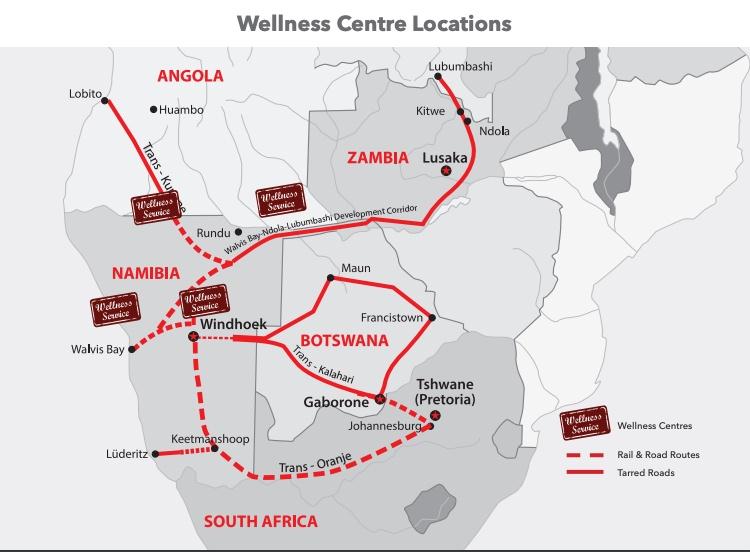Access for truckers to health and wellness services
The network of roadside wellness centres across the country was established in collaboration with industry partners.
It’s never been easy to stay fit or healthy on the long-haul, but it’s no longer possible to ignore the impact on truckers’ health. Over-reliance on their work environments and exposed to work-related stressors make health protection and promotion interventions invaluable for these long distance drivers.
Understanding the need to sustain the human capital within the transport sector, the Walvis Bay Corridor Group (WBCG), in relation with its core mandate, which focuses on trade facilitation, initiated a strategic project called the WBCG Wellness service to address the health and wellness needs of long distance truck drivers operating along its major corridors.
Project manager Edward Shivute explains that a network of roadside wellness centres across the country was established in collaboration with industry partners, the Ministry of Health and Social Services (MoHSS) and various development partners, while the Namibia Transport and Allied Workers Union (NATAU) and the Ministry of Works and Transport (MoWT) also support the project.
For the last decade, WBCG has run its health and wellness programme targeting the Namibian transport workers and specifically long-distance truck drivers, who are perceived to be at significant risk of contracting diseases including HIV while on the road. The organisation remains resolute in its pursuit to reduce the impact of HIV/Aids within this important, economic-driving industry.
These strategic and targeted health and wellness interventions coincides with the group’s vision to be the prime driver of self-sustaining HIV and Aids and employee wellness workplace programmes in the Namibian transport sector and the Southern African Development Community (SADC).
“The roadside wellness clinics located along the transport corridors provide comprehensive health and wellness services with a special focus on addressing HIV/Aids and other primary health care related services such as blood pressure and glucose testing, cholesterol and haemoglobin testing as well as tuberculosis screening and condom distribution to mobile and other key populations. The nature and the work of a truck driver is such that while on the road, they are required to consistently keep an eye on the cargo on the truck and to ensure safe and timely delivery, hence our roadside wellness clinics are conveniently located along these main transport corridors and border posts in order to offer the truckers the luxury of keeping an eye on their cargo while visiting the clinic”.
He says the clinics occasionally open during odd hours of the night to allow for the truckers to seek health services when they overnight in a particular town while waiting for the border to open its doors the next day or while they have their cross border documents perused and cleared.
Shivute further explains that sex workers and general border communities within close proximity of cross border areas also access health services at the clinics. “This is a demonstration, that we are not only taking care of the wellbeing of the truckers but also of those they are more likely to interact with as they navigate through various towns of Namibia”.
Through the HIV/Aids cross-border initiative that was implemented in partnership with the SADC secretariat since 2012, one of the main target groups are female sex workers whose age range between 15 to 39, of which women aged 15-24, according to the Namibia Population Based HIV Impact Assessment study conducted in 2018, have a far higher HIV incidence rate (0.99%) than same-aged young men (0.03%) in the country.
This highlights the continued need for expanded primary HIV prevention in young women. This age group is considered one of the most vulnerable groups in our society.
Through collaboration with the MoHSS and with support from the Global Fund through NANASO, WBCG has since January 2018, actively engaged in strategies to target out-of-school adolescent girls and young women (AGYW) with HIV prevention interventions including HIV testing. Through this partnership, over 8 000 girls have been tested in Ohangwena, Kavango East and Kavango West regions and now know their HIV status. A further 10 900 general community members have also accessed HIV testing services.
WBCG continues to work with various stakeholders including the media, MoHSS, Global Fund, USAID, FHI360, SFH, NANASO and most importantly the various companies that make use of its health and wellness services. “As we approach the World AIDS Day commemorations on 1 December 2019, we want to invite all our stakeholders to contact us so that we can plan initiatives within their workplace and or community”.
For more information, please contact Edward Shivute, wellness service project manager, at +264 61 251669 or send him an email at [email protected] or alternatively, visit our website at www.wbcg.com.na
Understanding the need to sustain the human capital within the transport sector, the Walvis Bay Corridor Group (WBCG), in relation with its core mandate, which focuses on trade facilitation, initiated a strategic project called the WBCG Wellness service to address the health and wellness needs of long distance truck drivers operating along its major corridors.
Project manager Edward Shivute explains that a network of roadside wellness centres across the country was established in collaboration with industry partners, the Ministry of Health and Social Services (MoHSS) and various development partners, while the Namibia Transport and Allied Workers Union (NATAU) and the Ministry of Works and Transport (MoWT) also support the project.
For the last decade, WBCG has run its health and wellness programme targeting the Namibian transport workers and specifically long-distance truck drivers, who are perceived to be at significant risk of contracting diseases including HIV while on the road. The organisation remains resolute in its pursuit to reduce the impact of HIV/Aids within this important, economic-driving industry.
These strategic and targeted health and wellness interventions coincides with the group’s vision to be the prime driver of self-sustaining HIV and Aids and employee wellness workplace programmes in the Namibian transport sector and the Southern African Development Community (SADC).
“The roadside wellness clinics located along the transport corridors provide comprehensive health and wellness services with a special focus on addressing HIV/Aids and other primary health care related services such as blood pressure and glucose testing, cholesterol and haemoglobin testing as well as tuberculosis screening and condom distribution to mobile and other key populations. The nature and the work of a truck driver is such that while on the road, they are required to consistently keep an eye on the cargo on the truck and to ensure safe and timely delivery, hence our roadside wellness clinics are conveniently located along these main transport corridors and border posts in order to offer the truckers the luxury of keeping an eye on their cargo while visiting the clinic”.
He says the clinics occasionally open during odd hours of the night to allow for the truckers to seek health services when they overnight in a particular town while waiting for the border to open its doors the next day or while they have their cross border documents perused and cleared.
Shivute further explains that sex workers and general border communities within close proximity of cross border areas also access health services at the clinics. “This is a demonstration, that we are not only taking care of the wellbeing of the truckers but also of those they are more likely to interact with as they navigate through various towns of Namibia”.
Through the HIV/Aids cross-border initiative that was implemented in partnership with the SADC secretariat since 2012, one of the main target groups are female sex workers whose age range between 15 to 39, of which women aged 15-24, according to the Namibia Population Based HIV Impact Assessment study conducted in 2018, have a far higher HIV incidence rate (0.99%) than same-aged young men (0.03%) in the country.
This highlights the continued need for expanded primary HIV prevention in young women. This age group is considered one of the most vulnerable groups in our society.
Through collaboration with the MoHSS and with support from the Global Fund through NANASO, WBCG has since January 2018, actively engaged in strategies to target out-of-school adolescent girls and young women (AGYW) with HIV prevention interventions including HIV testing. Through this partnership, over 8 000 girls have been tested in Ohangwena, Kavango East and Kavango West regions and now know their HIV status. A further 10 900 general community members have also accessed HIV testing services.
WBCG continues to work with various stakeholders including the media, MoHSS, Global Fund, USAID, FHI360, SFH, NANASO and most importantly the various companies that make use of its health and wellness services. “As we approach the World AIDS Day commemorations on 1 December 2019, we want to invite all our stakeholders to contact us so that we can plan initiatives within their workplace and or community”.
For more information, please contact Edward Shivute, wellness service project manager, at +264 61 251669 or send him an email at [email protected] or alternatively, visit our website at www.wbcg.com.na








Comments
Namibian Sun
No comments have been left on this article